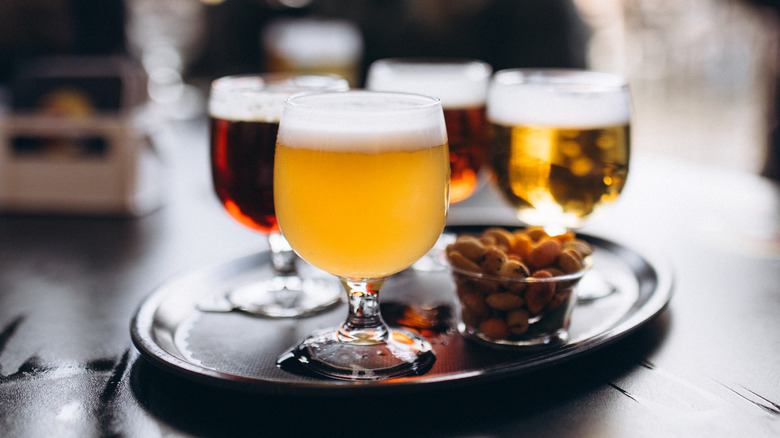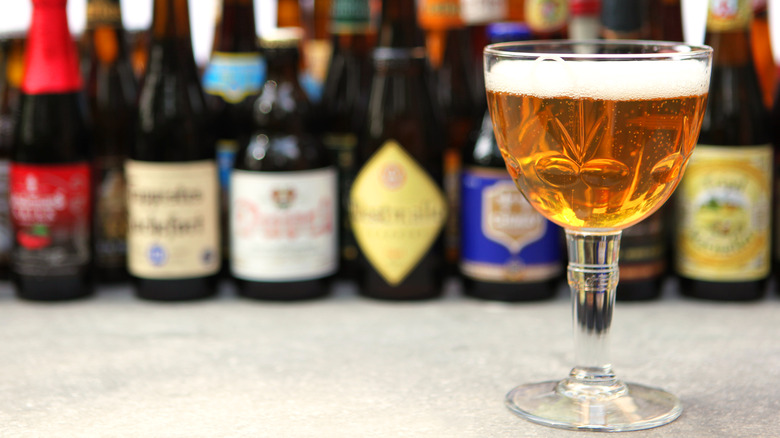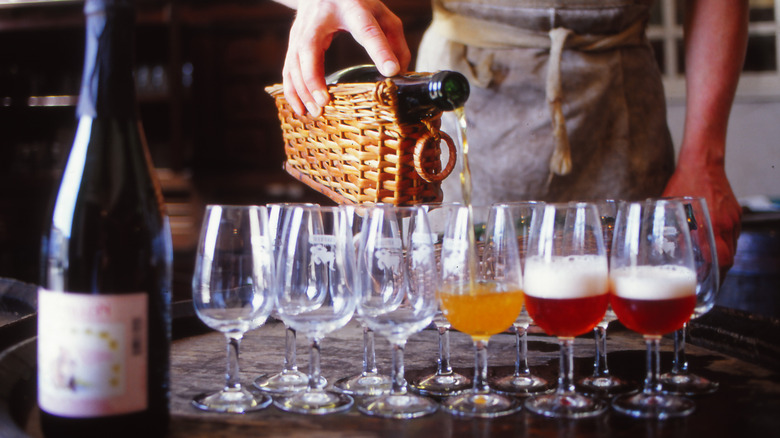The Unexpected Reason Rick Steves Suggests Avoiding Beer From The Tap In Belgium
Rick Steves knows Europe better than most of us know our own neighborhoods, and he's never shy about dishing out his most and least favorite places on the continent. Near the top of his favorites list is Bruges, Belgium, which happens to be a little-known European destination for food lovers. But Bruges isn't just about chocolate and waffles; it's also home to what Steves swears are Belgium's best pubs. In fact, these watering holes are so iconic that beer enthusiasts will cross continents just to have a sip. But if you're planning to belly up to the bar in Bruges — or anywhere in Belgium, really — ditch the habit of ordering a beer on tap. For the best Belgian beer experience, Steves says you've got to go for the ones stored in a bottle, because, apparently, that's where they stash the really good stuff.
Sure, when you think of Europe's best beers, Germany probably pops into your head first. But in an episode of "Rick Steves' Europe Travel Guide," the travel guru makes it clear that Belgium is on par with other renowned beer countries like Germany, England, and the Czech Republic. Belgium leaves them all in the dust variety-wise, though, with around 120 different types of beer to its name. While all of them are likely to be a joy to sip, if you really want to impress your taste buds, go for the bottled varieties. Those brews have been concocted with additional fermentation — unlike those tap pours.
The best Belgian beers are packaged in bottles
Make no mistake, Belgian beers are fantastic, whether they're on draft, craft, or bottled. After all, they dominated the 2024 World Beer Awards. But if you take one piece of advice from Rick Steves' top traveling tips, it's this: when visiting Belgium, make a beeline for bottled beers, the holy grail of brews. "The only way to offer so many excellent beers and keep them fresh is to serve them bottled," Steves wrote in his blog. "In fact, because many specialty beers ferment in the bottle, some of the most famous brews come only in bottles." He did note, though, that Belgian pubs are upping their game for their draft options.
And he's not off the mark here (honestly, when is he ever?). Take Westvleteren, for example. It's hailed as one of the best beers in the world and also happens to be one of the hardest to get your hands on —and yes, it's stored in a bottle. This elusive beer, crafted exclusively by Trappist monks, partly owes its legendary status to the fact that after its initial fermentation, it's transferred to a bottle for a second round of fermentation. This process, which takes two weeks in a temperature-controlled warehouse, is where the real magic happens. According to Beervana, this refermentation process, or bottle conditioning, lets the yeast develop further, brewing into something you'll be more than happy to guzzle. But don't worry if you can't snag a bottle of Westvleteren — plenty of Belgian breweries use this technique, so your chances of finding a memorable beer in a bottle are still pretty high.
The ABCs of Belgian beer according to Rick Steves
If you find yourself in Belgium and want to sample the country's best brews — bottled or otherwise — Rick Steves has top-notch recommendations. In a piece for Herald Net, he recounts an experience at a beloved bar in Bruges where he suggests that, if you want to taste something uniquely local, go for a Brugse Zot, a beer brewed right in the city. If you're new to beer or with someone who isn't a fan, a raspberry lambic is a safe choice. Steves also has a soft spot for Chimay, a Trappist monk brew he calls "the most milkshake-like brew I had ever tasted."
For ale lovers, Steves recommends trying a Kwak — an amber-based beer served in a quirky hourglass-shaped glass, making it an experience in itself. If you've got a sweet tooth, lambics are the way to go, as they're often infused with fruit. For those who prefer to keep things simple, like reaching for a Budweiser, opt for a lager, with Stella Artois and Jupiter being popular choices. But if you're feeling particularly daring, go ahead and order one of the stronger options like Duvel, which means "the devil," or Verboten Vrucht, translating to "forbidden fruit."
Not in the mood to hop from bar to bar? Steves suggests heading straight to 't Brugs Beertje, which offers 300 Belgian brews to choose from. Or, if you're into the idea of seeing how Belgian beer is made, make your way to Straffe Hendrik, a popular brewery that also offers beer tours and seasonal brews. Whatever you end up deciding, just remember to raise your glass and savor the flavors — after all, when in Belgium, do as the Belgians do: drink up, and enjoy every last drop.


